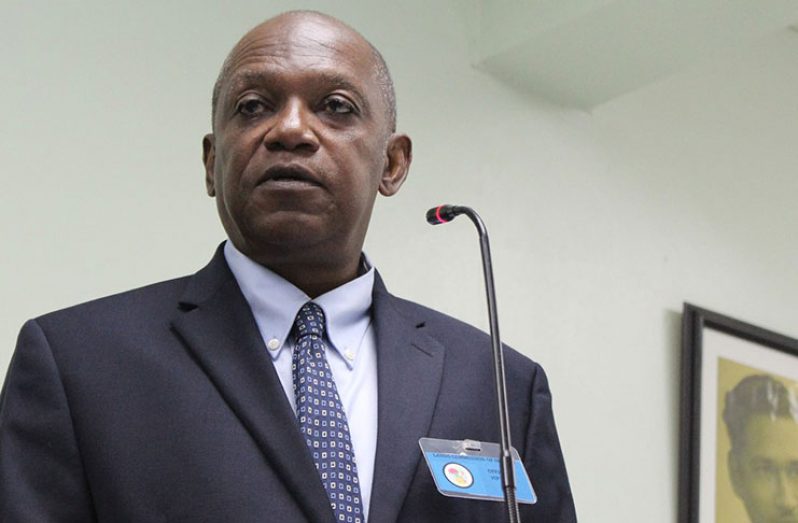…seek to engage government on implementation at soonest
By Vishani Ragobeer
THE Guyana Reparations Committee has crafted their Ancestral Rights Bills for Reparatory Justice for descendants of Enslaved Africans, replete with a Perpetual Trust, to claim land reparations from the state.
In 2017, while appearing before the Land Commission of Inquiry (CoI), Guyana Reparations Committee chairman, Eric Phillips, said that 18 per cent of Guyana’s land (approximately 15,000 square miles) should be given to the descendants of enslaved Africans as part of the reparatory justice owed. This, he said then, would be done through an Ancestral Rights Bill.
On Saturday, during an online forum organised by International Decade for People of African Descent Assembly-Guyana (IDPADA-G), in commemoration of Emancipation Day, it was made known that the African Ancestral Rights bill was completed and that it will be taken to the government for implementation at soonest.
“The Ancestral Rights Bill is designed to provide reparatory justice to descendants of Africans,” member of the organisation, Royston Peters said, adding, “Essentially, the parliamentary act legalises the provisions of lands, equal in area, to that indigenised by enslaved Africans.” The bill provides for all descendants of enslaved Africans in Guyana, including mixed-race Afro-Guyanese, to benefit from these land reparations.
In Guyana, throughout the centuries of African Enslavement, 473,000 African lives were lost. Additionally, there were a myriad of injustices faced by the Africans who were brought to Guyana and the Caribbean to provide unpaid labour. The Africans worked on plantations, which gave massive profits to the European colonial masters and importantly, developed much of Guyana’s land during the period of enslavement and in the post-Emancipation period, through the Village Movement.
“…Africans were not compensated for the centuries of forced labour (though their ‘owners were compensated for loss of their ‘property’) and their efforts at self advancement were deliberately smashed to meet the labour needs of the plantation. The historic village movement buckled under the weight of oppression and sabotage,” Senior Lecturer at the University of Guyana, Dr. Melissa Ifill wrote recently.
It is for these reasons, Phillips argued on Saturday’s online forum, that this reparatory justice from the state was a just cause. “Guyanese have already acknowledged reparations as a valid process through which the Amerindians would have gained their reparations,” Peters said, reminding that the Amerindian Act of 2006 provided the indigenous peoples with 13.8 per cent of Guyana’s land.
PERPETUAL TRUST
The Ancestral Bill also includes the provision of a Perpetual Trust, which will be the mechanism for managing the land resources received. Peters highlighted that this statutory trust will ensure that the proceeds from the land resources are invested in a manner which will continuously ameliorate the conditions of the descendants of the enslaved Africans in Guyana. “The descendants of enslaved Africans trust will be for the purpose of productive development for the mitigation and amelioration of current and future conditions of African-Guyanese,” Peters said.
In order to achieve this, he related that proceeds from these lands will be used to improve the lives and livelihoods of the descendants. This will be done through the provision of loans and grants, improving educational institutions, facilitating conferences and workshops, fostering community development, improvising productivity, inter alia. Peters also noted that the Trustees for the Perpetual Trust will be drawn from villages and wards developed and occupied by the formerly enslaved Africans and their descendants.
“These two significant instruments (the bill and the trust) are the core of specific justice management of the proceeds of our reparations or reparatory justice in the sense of African people in Guyana,” Peters said.
COURT ACTION
Furthermore, Phillips indicated that the Committee looks forward to the bill being passed this year, or by next. However, should there be opposition to the passage of the bill, the body is prepared to take the matter to the local courts, and if necessary, the International Court of Justice (ICJ). On the online forum, it was made known that there are several international provisions which pave the way for this reparatory justice from the state. African enslavement has been internationally recognised as a crime against humanity,
These include the United Nations Committee for the Elimination of Racial Discrimination CERD, the Durban Declaration and the Programme of Action, and the Universal Declaration of Human Rights. Currently, countries across the world are observing the United Nations International Decade for People of African Descent.
“Because there is already precedent in Guyana, the Amerindian Act of 2006… we will petition our government very soon to go to parliament and have the (our) to get us reparatory justice,” Phillips said. Across the Caribbean, the CARICOM Reparations Commission (CRC) has been working to garner reparations from the former colonising nations of Europe, namely the United Kingdom, France, Spain, Denmark, Germany, the Netherlands, Portugal, Norway, Sweden and Switzerland. Guyana’s Reparations Committee falls under the CRC and the local body has been working along with the regional commission to engage the European nations to provide reparations for the crimes against humanity committed during the period of enslavement. CARICOM’s body has outlined a 10-point plan for reparations: the issuance of a full and formal apology; repatriation; indigenous peoples development programme; cultural institutions; alleviating the public health crisis, particularly the Caribbean’s susceptibility of chronic diseases (hypertension and diabetes) rooted in the plantation diet; illiteracy eradication; an African knowledge programme; psychological rehabilitation; technology transfer; and, debt cancellation. Phillips, Guyana’s lead person on the CRC, indicated that the Guyana Reparations Committee has a “two-pronged” claim for reparatory justice; justice is being claimed from Britain and Holland, and justice is being claimed from the Government of Guyana.
“This is our quest, not only with the Guyana Reparations Committee but for all Africans and all African descendants in Guyana because Black Lives must matter,” he said.



.png)









